Did you get French and German on your 23andMe Ancestry Composition results? Your DNA matches this region, which means that you likely have ancestors who lived there at some point.
In this article, find out:
- What does it mean if you got French and German on your 23andMe results
- Which countries are included in this DNA region
- Whether French and German is genetically similar
- Tips for tracing your French and German ancestry
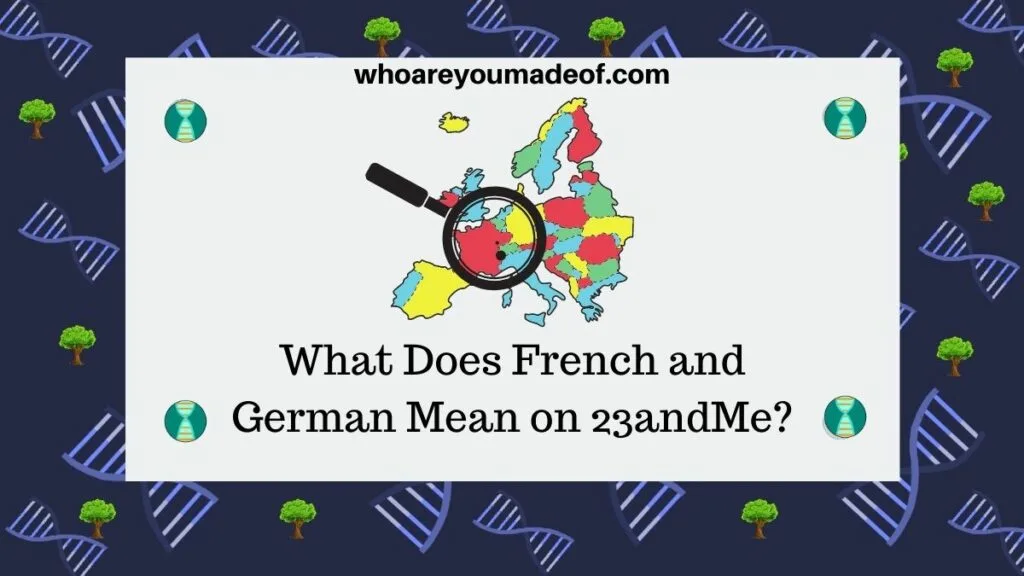
My dad, who has one German and one Dutch grandparent, received a whopping 51.8% French and German DNA on his 23andMe results. At first, this seemed a little odd.
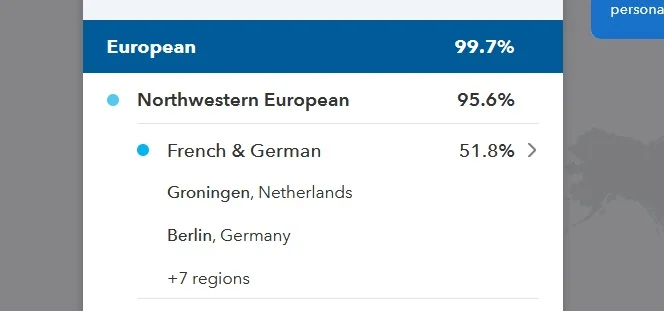
If only one of his grandparents was German, and none were French, how did he end up with so much of his DNA matching the German and French region on 23andMe? After digging in a little bit more to the data, I realized that his results make perfect sense.
By the end of this post, my goal is that you will be able to understand a little bit more about your results, too.
What does it mean if you got French and German in your DNA results?
If you got French and German in your 23andMe results, there is a high probability that you have ancestors who lived in the French and German region. This doesn't mean, however, that your ancestors were necessarily French or German.
I'll explain more about that in the next section.
If your DNA matches this region, it means that you inherited DNA from your ancestors who were from that region.
The percentage of DNA that you show as matching the French and German region may not directly match your family tree. In other words, if you have 25% French and German DNA, it doesn't necessarily mean that 25% of your ancestors were from that region.
This is because we don't share DNA with all of our ancestors. However, the more recent your French and German ancestry is, the higher percentage you would expect to see on your results.
Read more about how we inherited DNA that matches an ethnicity region:
What countries are included in the French and German DNA region on 23andMe?
According to 23andMe, there are seven European countries that are found within the French and German region. While each of these countries is distinct from the other, they do have a shared heritage:
- Netherlands
- Germany
- Austria
- Belgium
- France
- Luxembourg
- Switzerland
You can see whether your DNA matches areas within the specific countries listed above by clicking on French and German directly from your 23andMe Ancestry Composition results. You will be taken to a new page, where you will see exactly which countries your DNA seems to match.
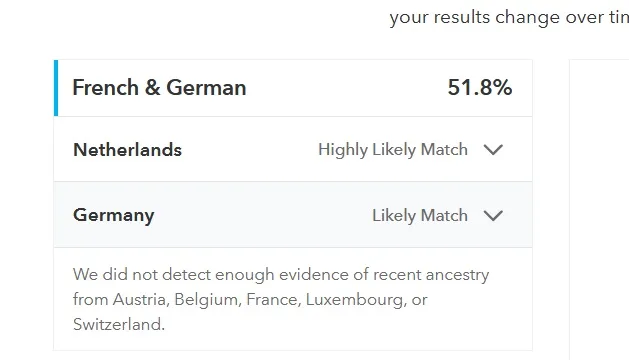
In addition, if your DNA shows a strong connection to one of the countries within the French and German region, you might even see a list of regions within the country that you match with. These could indicate exactly where within the country your ancestors may have lived:
When I did this with my father's results, I found that his DNA highly likely matches the Netherlands. My father's grandfather's family was from Groningen, which is the region within the Netherlands that most closely matches my dad's DNA:
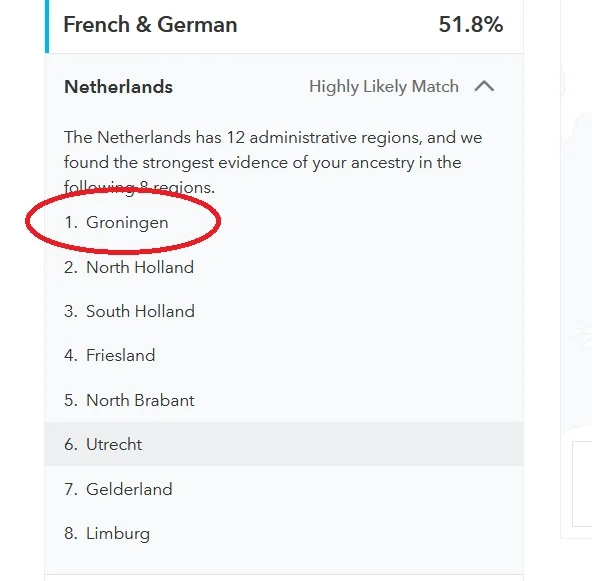
I thought it was very interesting how these results seemed to line up exactly with what I know about my Dutch great-grandfather's family tree.
Some of these regions include large cities, which are economic powerhouses and attract migrants from all over the country, which means that matching the region doesn't necessarily mean that your ancestors lived there.
For example, my father's DNA seems to match the Dutch province of North Holland, which coincidentally is where Amsterdam is located. The most likely explanation is that lots of people from Gronigen have migrated to North Holland in search of more economic opportunity over the past few hundred years.
I would recommend researching the individual regions that match your DNA in order to see which ones make the most sense based on your family tree and other factors.
How far back is your French and German ancestor?
Directly on your 23andMe results, you will be able to find an estimate as to how far back in your family tree you might need to look in order to find your ancestor who was from any of the seven countries in the French and German region.
If you scroll past your Ancestry Composition report, you will see your Ancestry Timeline. If you have a substantial percentage of DNA matching the French and German region, you might see French and German represented on your timeline.
The location of the region on the timeline is labeled approximately with years, and if you hover over the region you are interested in, you will see more details about which ancestors 23andMe estimates may have passed down DNA from that region.
For example, on my dad's 23andMe Ancestry Timeline, I can see that the French and German is his most recent region on the timeline. If I hover over it, I see that 23andMe suggests that he had a parent or a grandparent that was likely 100% from the French and German region:
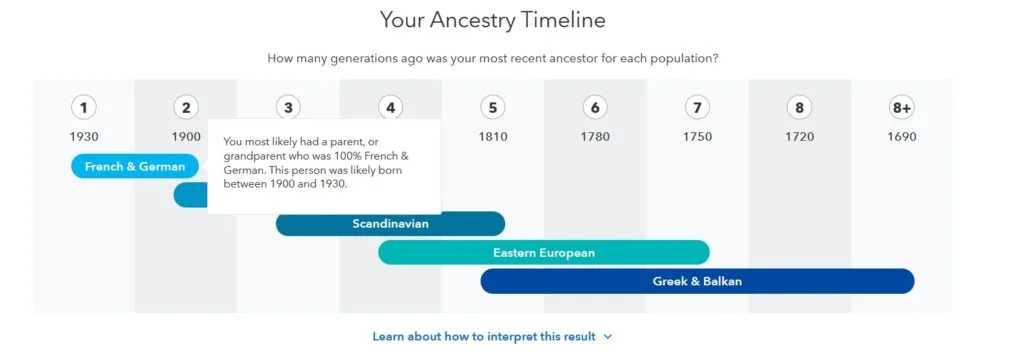
I highly recommend trying this with your own results to see what you discover. It's amazing what we can learn.
How to trace your French and German ancestry
You may be interested in learning more about your French and German DNA. There are many steps you can take to trace your ancestry from the French and German region to help determine which of your ancestors lived there.
Below, find some tips to help trace those ancestors, whether they lived in Belgium, the Netherlands, France, Germany, Austria, or Switzerland.
Use the 23andMe Family Tree feature
One of the most fun and interesting features of 23andMe results is the Family Tree tool. This tool can be accessed hovering over the Family and Friends tab at the top of the screen, as shown below:
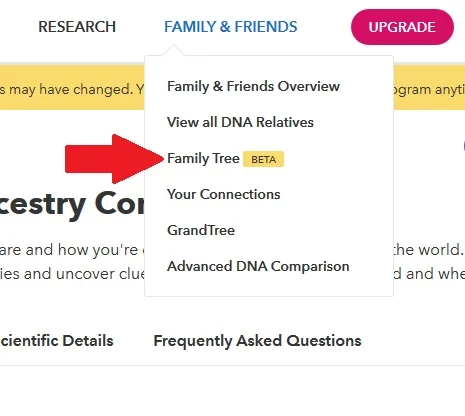
The 23andMe Family Tree is an interactive tool designed to help you understand how your DNA matches are related to you, and visualize where they are in your family tree. If you have not previously used it, you will have to take just a few minutes to set it up (recommended).
You can learn more about how to use this tool by reading the following post:
Conduct family history interviews with your older relatives
Our older family members are the most valuable source of family history information that we have access to, and I always recommend that we take the time to talk to them about their lives and memories whenever we have the opportunity.
You could conduct a "formal" family history interview, or you could just have a series of conversations (be sure to take notes!). This is an excellent way to get an idea as to which side of the family tree you will need to research to find your ancestors from the French and German region.
Build a family tree on a site like Ancestry
As you explore your DNA matches and talk to relatives about your family history, you will want to be sure to have a place to store everything that you learn in an organized way. Ideally, this is in a family tree.
There are so many excellent, free places to build a family tree. My favorite site is Ancestry, since they make it so easy.
Locate genealogy records pertaining to your ancestors
Finally, once you have a good idea as to the names of your recent ancestors going back a couple of generations, it might be time to explore genealogy records related to your ancestors. This is an excellent way to get details about where they were from.
Perhaps you will discover immigration records like passenger manifests or citizenship documents that help you discover in which of the seven countries your German and French ancestors lived.
Learn more about genealogy records in the following article:
Conclusion
I hope that this post has helped you learn more about how and why French and German ancestry shows up together on 23andMe results, and how to find out exactly where your ancestors lived within the region.
If you have any questions about something that you read in this post, or if you have a specific question about the percentage that you received, I would love to hear from you in the discussion below.
Thanks for stopping by today!


Jenny
Friday 30th of April 2021
Hi, I was told my grandparents were all completely English but I also found an unexpected result of over 50% German dna, including a recent grandparent who was 100% German. I can't seem to trace it as I don't have many living relatives but this was really insightful!
Mercedes
Friday 30th of April 2021
Thank you for your comment, Jenny! I wish you the best of luck in discovering your German roots. Sincerely, Mercedes